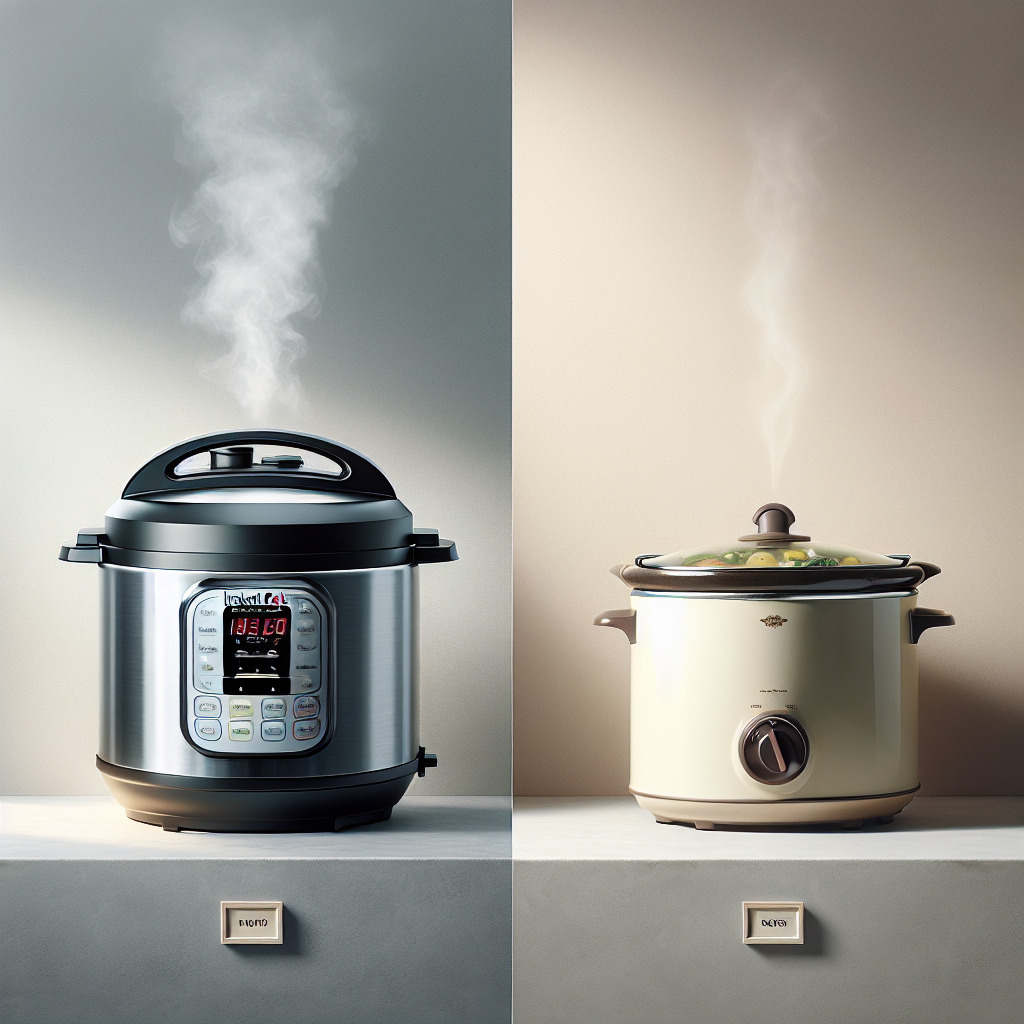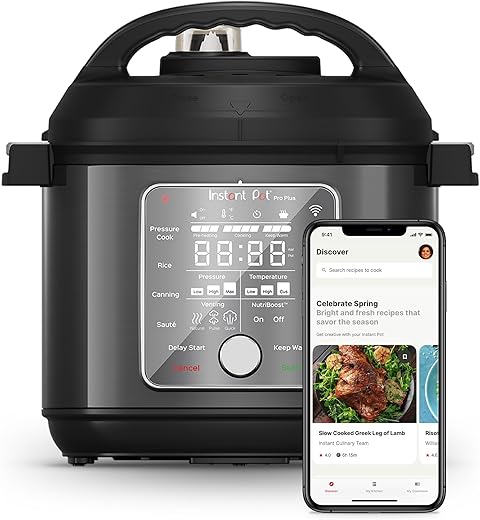The Instant Pot, a multifunctional electric appliance, has revolutionized home cooking by its ability to perform the functions of several kitchen devices in one, including those of a slow cooker. First introduced in 2010 by its Canadian inventor, Robert Wang, the Instant Pot offers a variety of cooking methods from pressure cooking to slow cooking, making it a versatile choice for busy households.
Slow cookers, on the other hand, have a longer history, having been introduced to the American market in the 1950s by the Rival Company as a “Crock Pot.” Initially popularized for their convenience, allowing users to prepare meals early in the day and come home to fully cooked dinners, slow cookers specialize in low-temperature cooking over many hours.
Approximately 80% of American households own a slow cooker because of its conveniences and energy efficiency. The typical energy use of a slow cooker for a standard recipe costs less than running an electric oven for an hour, appealing to those looking to reduce their energy consumption. The Instant Pot also boasts energy-saving features by using 70% less energy on average when compared to traditional cooking methods, thanks to its insulated cooking chamber.
While both aplliances offer unique set-it-and-forget-it functionality for cooking, the Instant Pot has gained a particularly loyal following through its multiple functions and faster cooking speeds thanks to its pressure cooking capabilities. The appliance has also sparked a community of users who share recipes and tips, enhancing its appeal by fostering a sense of community among its enthusiasts. Even with their differences, each appliance offers specific advantages for preparing a range of meals, from hearty stews to tender meats and more.
Which is Better for Easy Home Cooking: Instant Pot or Slow Cooker?
The debate between using an Instant Pot and a slow cooker often centers on their convenience and cooking efficiencies. An Instant Pot, often valued for its multifunctional capabilities, combines pressure cooking, slow cooking, and other functions all in one appliance, thereby dramatically reducing cooking times and saving energy. On the other hand, a slow cooker, as the name suggests, excels in slow-cooking methods, providing deep, even heat over extended periods, which is ideal for tenderizing meats and developing flavors in soups and stews. Each device offers distinct advantages depending on your cooking style, schedule, and the types of dishes you prepare. In the following sections, we will delve deeper into the comparative benefits, helping you determine which appliance best suits your culinary needs and lifestyle.
Comparing Functionality
When evaluating Instant Pot vs slow cooker, the primary difference lies in functionality. An Instant Pot is a multifunctional appliance that can perform the job of a slow cooker, as well as function as a pressure cooker, rice cooker, steamer, yogurt maker, and sauté pan. This versatility makes it a popular choice for those seeking to reduce kitchen clutter and enhance cooking efficiency. On the other hand, a slow cooker specializes in cooking food at a low temperature over several hours, which allows for deep flavor development particularly suitable for stews and braised dishes.
Cooking Speed and Efficiency
Speed is a significant factor in the comparison of Instant Pot vs slow cooker. Instant Pots are designed to cook food quickly using pressure cooking, significantly reducing cooking times—for example, a dish that might take four hours in a slow cooker could be cooked in less than an hour in an Instant Pot. This can be particularly advantageous for individuals with busy schedules. However, those who prefer the slow cooking process argue that it provides a richer flavor and better texture, especially for meat dishes.
Energy Consumption
Both Instant Pots and slow cookers are generally energy-efficient; however, the cooking method impacts overall energy use. Slow cookers use less energy per hour but cook for a longer period, which can result in higher total energy consumption depending on the recipe. In contrast, Instant Pots use more power but cook for a considerably shorter time, which can translate to less energy used in the overall cooking process.
User-Friendliness
The learning curve associated with each appliance is also a factor to consider. Instant Pots require a bit more learning due to their multiple functions and settings. New users may need to spend some time understanding the various features and cooking modes. Conversely, slow cookers offer a more straightforward, set-it-and-forget-it approach, making them particularly friendly for novice cooks or those who prefer not to interact much with their cooking appliances.
Cost Considerations
When it comes to cost, slow cookers generally tend to be less expensive than Instant Pots. The basic models of slow cookers can be quite affordable, making them a good entry-level choice for budget-conscious consumers. However, with the increasing popularity of Instant Pots, there are often deals and discounts available, which can mitigate the price difference, making them an equally attractive option financially.
Maintenance and Durability
Maintenance is another important aspect to consider. Instant Pots, with their diverse functionality and more complex construction, may require more careful maintenance and occasional replacement of parts like sealing rings and the steam release handle. Slow cookers, being less complex, generally require less maintenance and are easier to clean, which could be a decisive factor for those who prefer convenience and low maintenance appliances.
Latest Trends and Popularity
According to recent sales data, Instant Pots continue to see an increase in popularity, often cited for their convenience and time-saving qualities. Conversely, the popularity of slow cookers remains constant, highlighting a dedicated user base that values the specific cooking qualities such as flavor enhancement and ease of use. In a 2023 statistic, a survey found that 40% of U.S. households own an Instant Pot, while 53% have a slow cooker, indicating significant market penetration for both types of appliances.
https://youtube.com/watch?v=yAT7wjWxzJ0
Instant Superior Cooker 7.5QT Slow Cooker and Multicooker, 4-in-1 Functions, Sears/Sauté, Slow Cooks/Roast, Steams and Warms, From The Makers of Instant Pot
Instant Pot Duo 7-in-1 Electric Pressure Cooker, Slow Cooker, Rice Cooker, Steamer, Sauté, Yogurt Maker, Warmer & Sterilizer, Includes App With Over 800 Recipes, Stainless Steel, 8 Quart
Instant Pot Duo Plus, 6-Quart Whisper Quiet 9-in-1 Electric Pressure Cooker, Slow Rice Steamer, Sauté, Yogurt Maker, Warmer & Sterilizer, Free App with 800+ Recipes, Stainless Steel
1. What is the main difference between an Instant Pot and a slow cooker?
The primary difference lies in their cooking methods and features. An Instant Pot is a multi-cooker with functions like pressure cooking, slow cooking, and sautéing, allowing it to cook food quickly or slowly. A slow cooker, on the other hand, cooks food steadily over a long period, typically using low or high heat settings without pressure cooking capabilities.
2. Can Instant Pot perform all the functions of a slow cooker?
Yes, most Instant Pot models include a slow cook feature that mimics traditional slow cooking, though it may not always match the exact results of a standalone slow cooker due to differences in heat distribution and lid design.
3. Is an Instant Pot faster than a slow cooker?
Yes, when using the pressure cooking function, an Instant Pot can cook meals significantly faster than a slow cooker. It uses high pressure to speed up the cooking process, which can dramatically reduce cooking times.
4. Which is more energy-efficient, Instant Pot or slow cooker?
Generally, an Instant Pot is more energy-efficient, especially when used in pressure cooking mode. This is because it cooks faster and more efficiently, requiring less electricity over time compared to a slow cooker that operates over several hours.
5. What types of dishes are best for a slow cooker?
Slow cookers excel at dishes like stews, soups, and casseroles where a long, slow cook time helps tenderize meats and develop flavors. They are perfect for ‘set it and forget it’ cooking methods.
6. Can you leave both an Instant Pot and a slow cooker unattended while cooking?
It is generally safe to leave both devices unattended while they cook. However, as with any cooking appliance, it’s important to follow manufacturer instructions and safety guidelines to ensure safe operation.
7. How do cleaning requirements compare between an Instant Pot and a slow cooker?
Both appliances are typically easy to clean. Most parts, like the inner cooking pots and lids, are dishwasher safe. The Instant Pot might require additional steps to clean the sealing ring and steam vent.
8. Do Instant Pots and slow cookers have a risk of overcooking?
Slow cookers have a very low risk of overcooking since they use low temperatures. Instant Pots also minimize this risk with timers and automatic shut-off features. However, due to the higher cooking temperatures, there’s a slightly higher chance of overcooking in an Instant Pot if not monitored or if settings are misjudged.
9. Are Instant Pots more expensive than slow cookers?
Generally, Instant Pots are more expensive than slow cookers due to their multi-functionality and advanced features. The price can vary based on model, size, and features included.
10. Which appliance is better for a novice cook, Instant Pot or slow cooker?
Slow cookers can be more forgiving and may be easier for novice cooks because of their simplicity and the low risk of overcooking. Instant Pots, while initially more complex due to their various functions, offer more versatility and can be equally user-friendly once the user is acquainted with the different cooking modes.
Conclusion: Choosing Between Instant Pot and Slow Cooker
When deciding whether an Instant Pot or a slow cooker is the better option for your kitchen, consider your cooking style and schedule. The Instant Pot excels in versatility and speed, making it ideal for those with a busy lifestyle who still wish to prepare a variety of healthy meals. Its multiple functions, including pressure cooking, sautéing, and steaming, allow for preparing dishes substantially faster than traditional methods. Furthermore, the Instant Pot’s features support those looking to experiment with different cooking techniques without the need for multiple appliances.
In contrast, the slow cooker shines in its simplicity and its ability to enhance the flavors of dishes through prolonged cooking times. It is especially suitable for those who prefer to prepare meals with minimal intervention. The slow cooker’s method of low and slow cooking is perfect for tenderizing meats and developing deep, complex flavors in soups and stews. Though it lacks the multifunctionality of the Instant Pot, its ease of use and ability to create nutritious, flavorful meals with little effort make it a valuable tool for both novice and experienced cooks who value the process of slow-cooked meals.









